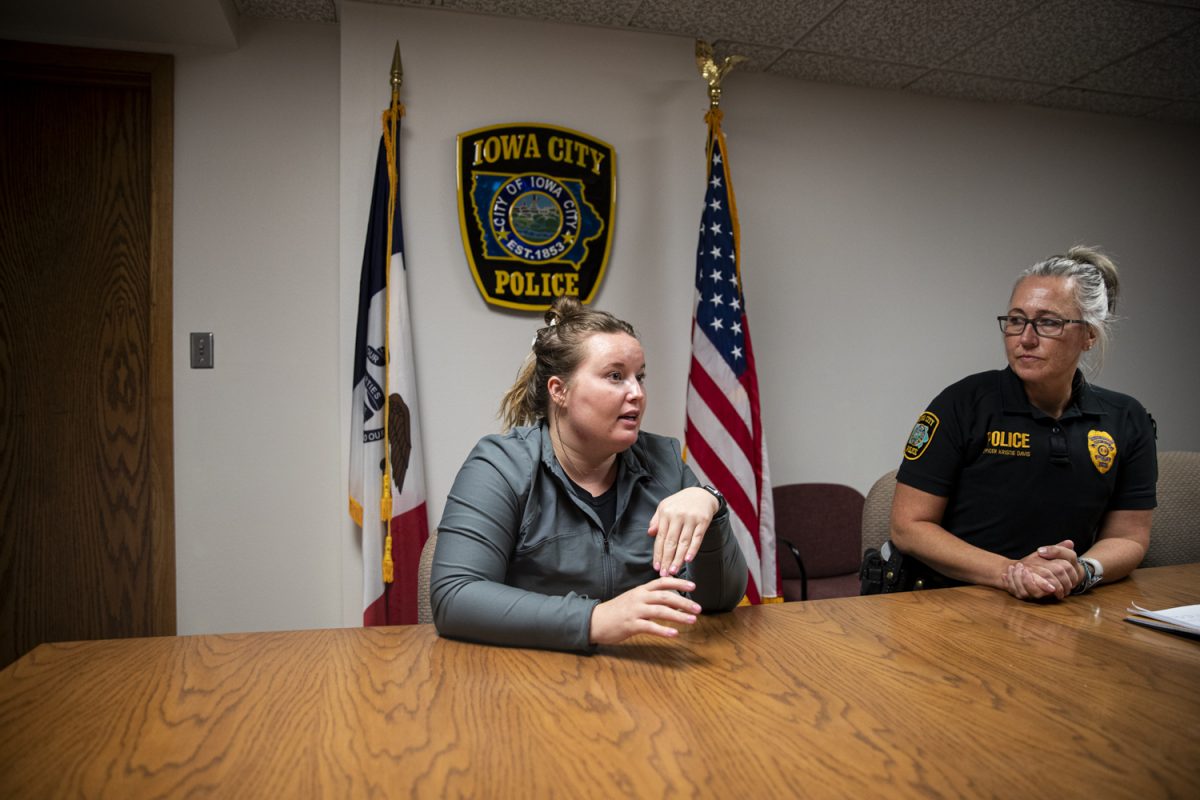The Iowa City Police Department has launched its first-ever crisis co-responder team, pairing an officer with a mental health liaison to de-escalate crises, provide on-scene support, and connect individuals to essential services.
The unit is made up of Officer Kristie Davis, who has been with the Iowa City Police Department since 2015, and Kelsie Tomlin, a mental health liaison from CommUnity Crisis Services, who joined the department in June.
Tomlin and Davis respond to a variety of calls, including welfare checks for individuals who may be suicidal, self-harming, or have not been in contact with others. They connect people with resources like the GuideLink Center or offer other needed support based on the situation.
“We’re building that bridge of trust with [people in crisis], that when we make contact with them, they know that we’re not out to arrest them for what’s going on,” Davis said. “We’re there to help them, not send them to jail.”
Tomlin said her role as a mental health professional — rather than a police officer — helps facilitate conversations with people in crisis.
“We had a situation a couple weeks ago where an individual did not want to speak with officers, but they were willing to speak with me,” Tomlin said. “And we were able to come up with a plan from there and make sure that they were safe.”
Previously, Tomlin piloted a similar mental health liaison program with Wapello County and Ottumwa law enforcement in 2021. Tomlin said her role with Iowa City police is different from her previous role, where she responded on an as-needed basis.
RELATED: Iowa City Police Department nears full capacity for officers
Now, she will be paired with Davis, responding to crisis situations daily.
“It’s super helpful with Christy because she has been in the department for nine years, and also being involved in crisis work already,” Tomlin said. “So, we kind of think alike, which is really helpful.”
Davis has spent most of her law enforcement career on late-night patrol, specializing in victim and trauma-informed response. She is also a member of the department’s Crisis Negotiation and Peer Support teams.
Davis hopes that by building rapport with at-risk individuals, she and Tomlin will create benefits for both the community and the department.
“We’re trying to get away from the active police response to somebody who’s going through a crisis,” Davis said. “Which then, in turn, helps to lower arrest rates and use of force from officers.”
Although Tomlin is employed by the department, she is not a law enforcement officer and does not carry a weapon. She and Davis work together to assess the risk of each call to ensure the safety of everyone involved.
“I’m able to pull up past history calls for certain individuals to see if there’s a pattern of threat levels, or if there’s any kind of higher level of danger,” Davis said, adding that she will make the initial contact in such situations.
While the Iowa City City Council developed a preliminary plan to restructure the police department in 2020, Iowa City Police Department Captain Denise Brotherton said that community policing efforts had been in the works well before that plan.
“To us, it’s really not police reform and response to any of the actions that happened in 2020,” Brotherton said. “It is something that we have been in the works in Johnson County for several years now because we saw a need of a better response to crisis in our community.”
Brotherton said the department has required all its officers to complete crisis intervention training before the City Council’s preliminary plan, and the co-responder team is a continuation of those existing community policing efforts.
“It’s just been a matter of getting the funding and having the personnel to be able to do it,” Brotherton said.



